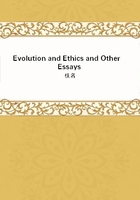
第35章
The state of mind of the Arahat in which the desire of life has ceased is Nirvana. Dr. Oldenberg has very acutely and patiently considered the various interpretations which have been attached to "Nirvana" in the work to which I have referred. The result of his and other discussions of the question may I think be briefly stated thus:
1. Logical deduction from the predicates attached to the term "Nirvana" strips it of all reality, conceivability, or perceivability, whether by Gods or men. For all practical purposes, therefore, it comes to exactly the same thing as annihilation.
2. But it is not annihilation in the ordinary sense, inasmuch as it could take place in the living Arahat or Buddha.
3. And, since, for the faithful Buddhist, that which was abolished in the Arahat was the possibility of further pain, sorrow, or sin; and that which was attained was perfect peace; his mind directed itself exclusively to this joyful consummation, and personified the negation of all conceivable existence and of all pain into a positive bliss.
This was all the more easy, as Gautama refused to give any dogmatic definition of Nirvana. There is something analogous in the way in which people commonly talk of the "happy release" of a man who has been long suffering from mortal disease. According to their own views, it must always be extremely doubtful whether the man will be any happier after the "release" than before. But they do not choose to look at the matter in this light.
The popular notion that, with practical, if not metaphysical, annihilation in view, Buddhism must needs be a sad and gloomy faith seems to be inconsistent with fact; on the contrary, the prospect of Nirvana fills the true believer, not merely with cheerfulness, but with an ecstatic desire to reach it.
The influence of the picture of the personal qualities of Gautama, afforded by the legendary anecdotes which rapidly grew into a biography of the Buddha; and by the birth stories, which coalesced with the current folk-lore, and were intelligible to all the world, doubtless played a great part. Further, although Gautama appears not to have meddled with the caste system, he refused to recognize any distinction, save that of perfection in the way of salvation, among his followers; and by such teaching, no less than by the inculcation of love and benevolence to all sentient beings, he practically levelled every social, political, and racial barrier. A third important condition was the organization of the Buddhists into monastic communities for the stricter professors, while the laity were permitted a wide indulgence in practice and were allowed to hope for accommodation in some of the temporary abodes of bliss. With a few hundred thousand years of immediate paradise in sight, the average man could be content to shut his eyes to what might follow.
In ancient times it was the fashion, even among the Greeks themselves, to derive all Greek wisdom from Eastern sources; not long ago it was as generally denied that Greek philosophy had any connection, with Oriental speculation; it seems probable, however, that the truth lies between these extremes.
The Ionian intellectual movement does not stand alone. It is only one of several sporadic indications of the working of some powerful mental ferment over the whole of the area comprised between the Aegean and Northern Hindostan during the eighth, seventh, and sixth centuries before our era. In these three hundred years, prophetism attained its apogee among the Semites of Palestine; Zoroasterism grew and became the creed of a conquering race, the Iranic Aryans; Buddhism rose and spread with marvellous rapidity among the Aryans of Hindostan; while scientific naturalism took its rise among the Aryans of Ionia. It would be difficult to find another three centuries which have given birth to four events of equal importance. All the principal existing religions of mankind have grown out of the first three: while the fourth is the little spring, now swollen into the great stream of positive science. So far as physical possibilities go, the prophet Jeremiah and the oldest Ionian philosopher might have met and conversed. If they had done so, they would probably have disagreed a good deal; and it is interesting to reflect that their discussions might have embraced Questions which, at the present day, are still hotly controverted.
The old Ionian philosophy, then, seems to be only one of many results of a stirring of the moral and intellectual life of the Aryan and the Semitic populations of Western Asia. The conditions of this general awakening were doubtless manifold; but there is one which modern research has brought into great prominence. This is the existence of extremely ancient and highly advanced societies in the valleys of the Euphrates and of the Nile.
It is now known that, more than a thousand--perhaps more than two thousand--years before the sixth century B.C., civilization had attained a relatively high pitch among the Babylonians and the Egyptians. Not only had painting, sculpture, architecture, and the industrial arts reached a remarkable development; but in Chaldaea, at any rate, a vast amount of knowledge had been accumulated and methodized, in the departments of grammar, mathematics, astronomy, and natural history. Where such traces of the scientific spirit are visible, naturalistic speculation is rarely far off, though, so far as I know, no remains of an Accacian, or Egyptian, philosophy, properly so called, have yet been recovered.